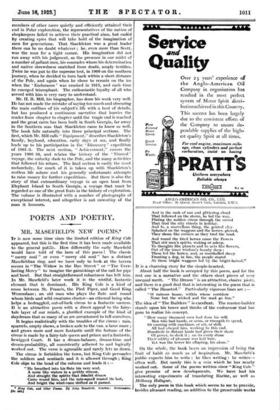POETS AND POETRY.
MR. MASEFIELD'S NEW POEMS.*
IT is now some time since the limited edition of King Cote
appeared, but this is the first time it has been made available to the general public. How differently the early Masefield would have told of the hero of this poem ! The classic " merry soul " or even " merry old soul " has a distinct Masefleldian ring, and we have only to look at the tavern scenes in " The Widow in the Bye Street " or " The Ever- lasting Mercy" to imagine the garnishings of the call for pipe and bowl. But that straightforward robustness has left him. In Mr. Masefield's later work it is the wistful, fantastic element that is dominant. His King Cole is a kind of cross between St. Francis, the Pied Piper, and Good King Wenceslaus ; an old man who plays the flute and round whom birds and wild creatures cluster—an ethereal being who helps a bedraggled, out-of-luck circus to a fantastic success. It is an attractive poem with a direct appeal to the fairy- tale layer of our minds, a glorified example of the kind of daydream that so many of us are accustomed to tell ourselves. It begins realistically with the troubles of the circus : rain, quarrels, empty shows, a broken axle to the van, a lame mare ; and grows more and more fantastic until the fortune of the circus is made by a fairy-tale queen and prince and a fantastic, bewigged Court. It has a dream-balance, dream-time and
dream-probability, all consistently adhered to and logically worked out. The verse is agreeable and rarely lets us down.
The circus is forbidden the town, but King Cole persuades the soldiers and sentinels and it is allowed through ; King Cole skips to the head of the column and leads it :—
" He breathed into his flute his very soul, A noise like waters in a pebbly stream,
And straight the spirits that inhabit dream Came round him, and the rain-squall roared its last, And bright the wind-vane shifted as it passed
• King Cole, and Other Poems. ny John Masefietd. London: lielnentinn. Ds. net) And in the rush of sun and glittering cloud That followed on the storm, he led the way, Fluting the sodden circus through the crowd That trod the city streets in holiday. And lo, a marvellous thing, the gouted clay Splashed on the waggons and the horses, glowed, They shone like embers as they trod the road.
And round the tired horses came the Powers That stir men's spirits, waking or asleep. To thoughts like planets and to acts like flowers, Out of the inner wisdom's beauty deep : These led the horses, and, as marshalled sheep Fronting a dog, in line, the people stared At those bright waggons led by the bright-haired."
It is a charming story for the simple-hearted.
About half the book is occupied by this poem, and for the rest one is a narrative and the others short pieces of very unequal merit. " The Dream" is an attractive, elusive piece, and there is a good deal that is interesting in the poem that is called " The Haunted." Particularly vigorous lines are :— " 0 ruinous house, within whose corridors None but the wicked and the mad go free."
The idea of " The Builders " is excellent. The master-builder stands upon his tower and thinks of the endeavour that has gone to realize his concept.
" How many thousand men had done his will,
Men who had hands, or arms, or strength to spend, Or cunning with machines, or art, or ski All had obeyed him, working to this end.
Hundreds in distant lands had given their share
Of power, to deck it ; on its every stone Their oddity of pleasure was laid bare, Yet was the tower his offspring, his alone."
On the whole, the book bears an impression of being the fruit of habit as much as of inspiration. Mr. Mascheld's public expects him to write : he likes writing : he writes— often well. But surely this is a vein which he has nearly worked out. Some of the poems written since "King Cole" give promise of new developments. We have had his interesting experiments of translating Racine, as well as Melloney Holispur.
The only poem in this book which seems to me to provide, besides pleasant reading, an addition to the preservable works
of Mr. Masefleld is " The Dream." It is elusive : it contains many of the Masefleldian clichés and truisms, but what I take to be the controlling idea seems to me to be of interest, and in a vague sort of way to have been treated rather successfully. The dreamer arrives, we are not quite sure where, but it is thus described :—
" And then I came into a grassy place - Where beauty of bright heart has quiet face."
Anyhow, there is a castle which he enters and explores, and in his dream achieves the experience of all the associations that could be called up by normal sight and sound. The tapestry is a wood or a sea ; the books are the things they describe. The rooms are like the shield in the Iliad, figured with battles, harvests, shipwrecks. The dreamer perceives directly the thing represented, not the representation. The poem leaves a curious and definite impression on the mind of







































 Previous page
Previous page